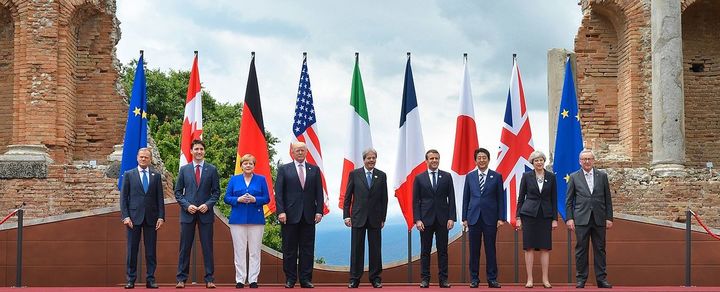Making America Dispensable Again

Artículo publicado en http://www.huffingtonpost.com/author/alana-moceri
Trump’s trip left a big impression on our European allies. So much, that German Chancellor Angela Merkel turned around and announced at a campaign rally that “the times when we could completely rely on others are, to an extent, over.”
We know perfectly well who the ‘others’ she refers to are. So let that sink in and then read on: “I experienced that in the last a few days, and therefore I can only say that we Europeans must really take our fate into our own hands, of course in friendship with the United States and in friendship with Great Britain and as good neighbors wherever it is possible, also with Russia and also with all the other countries, but we need to know that we have to fight for our own future and destiny as Europeans.”
The Trump-shove, the denied hand-holding, the rowdy hand-shaking make up the blur of video-loop splendor that dominated the social media. But Merkel, who’s no stranger to Trump’s antics was talking about Trump’s positions. He was the president of no: no support for the mutual defense of NATO allies, especially with an increasingly belligerent Russia and no to language supporting the Paris climate accord and free trade in the Group of 7 declaration. So, while some of the optics might have been funny, the laughs, I’m afraid, came not just at the Donald’s expense but at ours: the world is coming to terms with a United States of America that is no longer the indispensable nation.
The fact that Merkel made these statements during a rally might lead some to write it off as mere campaign rhetoric, but it speaks volumes because it resonates with the German people. Politicians play catch up with public opinion much more than they influence it. Successful ones are loud speakers wired to the emotion of the times. So, it’s not surprising that quite a few of us are musing that Merkel’s statement may just mark a before and after in terms of America’s place in the world.
U.S. politicians love to crow about us being the indispensable nation. And for the most part, the world has accepted this, albeit in a rather love-hate fashion. I always get a laugh in class when I pump my fists in the air and chant U-S-A in response to any kind of American chest thumping. After all, world politics revolves around us, not to mention the lion’s share of popular culture: the rest of the world knows us yet they don’t always understand us. At the same time, there’s always going to be resentment towards any country that wields such power. I’m quite aware that I might be one of the few Americans my students will get to spend any significant amount time with and so I try to show them some irreverence, humanity and, yes, humility.
Why should we care what foreign people and politicians think of us?
Because a positive image in the world translates into what political scientists and diplomats call soft power. Our embassies around the world spend a pretty big chunk of their day to day work on public diplomacy activities, centered around culture, sports, education, technology and media, which attempt to create good impressions of the U.S. among foreign publics. Joseph Nye’s theory is that when the citizens of another country have a positive view of the U.S. it improves our chances of being able to achieve our foreign policy goals with that country. This soft power, the power of attraction contrasts with hard power, the power of coercion, such as military might and economic sanctions.
It’s unfortunate that these terms have become known as hard and soft power, since we can all easily imagine some poor advisor trying to explain their subtleties to Trump. It’s easy to imagine in all its Twitterish gibberish: What kind of loser idea is soft power? I guarantee you, there’s nothing soft going on here!
Trump’s budget reflects a foreign policy that relies exclusively on hard power. It raises military spending by 10 percent while it guts the state department and foreign aid, not to mention the delicate safety net of domestic welfare spending that keeps our poorest just a breath away from the streets. That doesn’t help our image abroad either, it just makes us look brutish.
Soft power was critical during the Cold War, so much so, that foreign outcry over the Little Rock crisis of 1957 is part of what finally pushed President Eisenhower to send in the National Guard to protect nine black students as attended a racially segregated high school. At that point, the U.S. was locked in a battle with the Soviet Union, which included an arms race, but largely depended on attracting allies from around the world to our brand of democracy.
Our economic and military strength have been critical, but what has made us indispensable is the seductiveness in that what we want—peace, security and stability—is what our allies around the world want. Trump’s haphazard, unpredictable, bullying and transactional foreign policy is convincing many of our friends that the U.S. can no longer be relied upon. He can’t strong-arm these countries into believing in us again, he can’t just bomb the shit out of them. No. In just a few months he’s managed to start unraveling the world order that the U.S. and Europe have so painstakingly built since World War II. An America that ignores soft power will most certainly become dispensable. Congratulations Mr. President.


